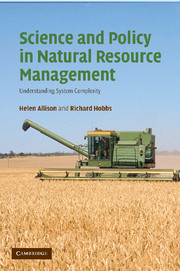Book contents
- Frontmatter
- Contents
- List of illustrations
- List of tables
- Foreword
- Preface
- Acknowledgements
- List of abbreviations
- 1 Introduction
- 2 Historical and policy context
- 3 Natural resource degradation: a resistant problem of the twentieth century
- 4 The epistemology of natural resource management of the twentieth century
- 5 A contemporary epistemology and framework for natural resource management of the twenty-first century
- 6 Model conceptualisation of the Western Australian agricultural region. Part 1: resilience analysis
- 7 Model conceptualisation of the Western Australian agricultural region. Part 2: system dynamics
- 8 Synthesis
- Epilogue
- Glossary
- References
- Index
Epilogue
Published online by Cambridge University Press: 01 March 2010
- Frontmatter
- Contents
- List of illustrations
- List of tables
- Foreword
- Preface
- Acknowledgements
- List of abbreviations
- 1 Introduction
- 2 Historical and policy context
- 3 Natural resource degradation: a resistant problem of the twentieth century
- 4 The epistemology of natural resource management of the twentieth century
- 5 A contemporary epistemology and framework for natural resource management of the twenty-first century
- 6 Model conceptualisation of the Western Australian agricultural region. Part 1: resilience analysis
- 7 Model conceptualisation of the Western Australian agricultural region. Part 2: system dynamics
- 8 Synthesis
- Epilogue
- Glossary
- References
- Index
Summary
The difference between a good mechanic and a bad one, like the difference between a good mathematician and a bad one, is precisely this ability to select the good facts from the bad ones on the basis of quality. He has to care! This is an ability about which formal traditional scientific method has nothing to say. It's long past time to take a closer look at this qualitative preselection of facts which has seemed so scrupulously ignored by those who make so much of these facts after they are “observed”. I think that it will be found that a formal acknowledgement of the role of Quality in the scientific process doesn't destroy the empirical vision at all. It expands it, strengthens it and brings it far closer to actual scientific practice.
I think the basic fault that underlies the problem of stuckness is traditional rationality's insistence upon “objectivity”, a doctrine that there is a divided reality of subject and object. For true science to take place these must be rigidly separate from each other. “You are the mechanic. There is the motorcycle. You are forever apart from one another. You do this to it. You do that to it. These will be the results.”
This eternally dualistic subject–object way of approaching the motorcycle sounds right to us because we're used to it. But it's not right. It's always been an artificial interpretation superimposed on reality. It's never been reality itself. When this duality is completely accepted a certain nondivided relationship between the mechanic and motorcycle, a craftsmanlike feeling for the work, is destroyed.
- Type
- Chapter
- Information
- Science and Policy in Natural Resource ManagementUnderstanding System Complexity, pp. 202Publisher: Cambridge University PressPrint publication year: 2006



